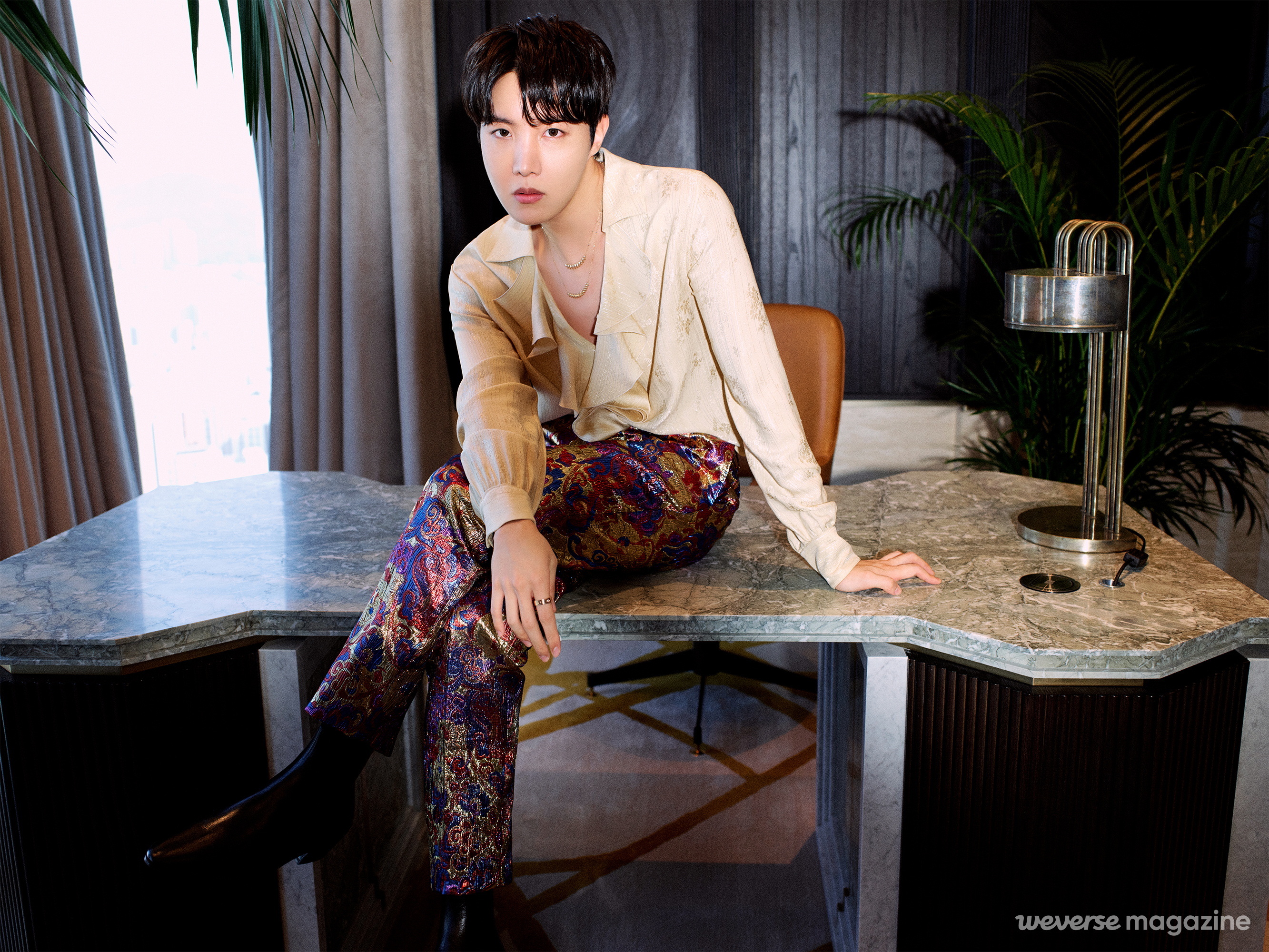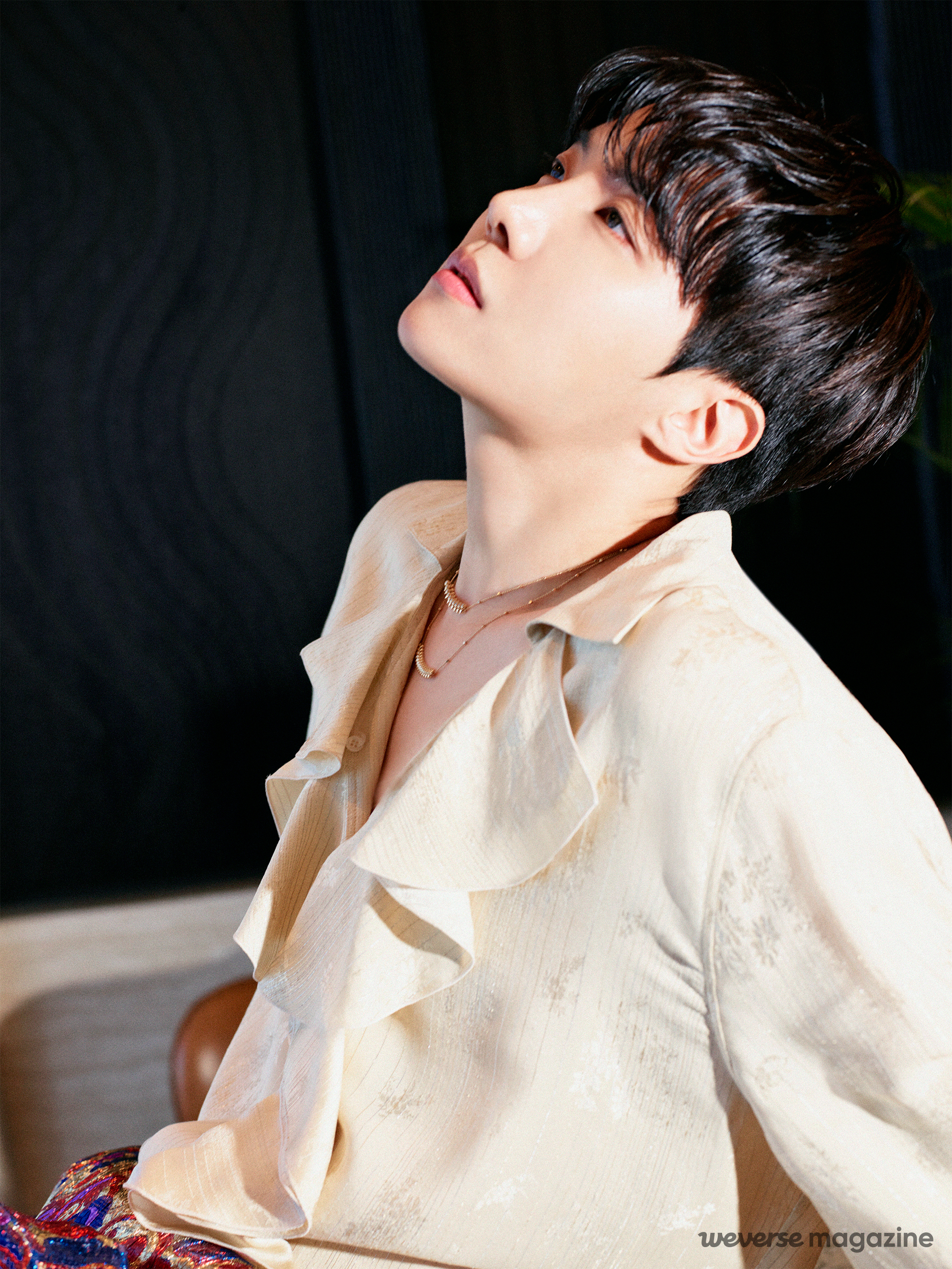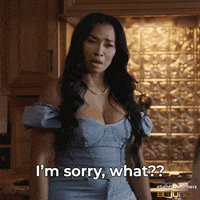On BTS’ j-hope, j-hope’s BTS, and j-hope himself.
 Pants by Dolce & Gabbana, necklace by Cartier.
Pants by Dolce & Gabbana, necklace by Cartier.
You just released Proof, a collection of different songs that capture the essence of BTS. How are you feeling?j-hope: It did need to be organized at some point, didn’t it? By taking a look back on our timeline, we thought it was the right time to show people who recently became ARMY how we got to where we are today and show all the topics we’ve dealt with all in one place. And we think that it will also be an album that stirs up deep emotions for ARMY who have been with us from the beginning. Our timeline is basically ARMY’s timeline. We made this an album for ARMY who have taken this journey with us, one they would likely cherish, so we had a lot of fun revisiting old memories while making it.
The song “Run BTS” is itself a look back at the path BTS has taken. You give a shout-out to the other members, saying that they have all been through a lot. (laughs)
j-hope: They really did go through a lot. That’s a fact. (laughs) We all went through a lot and worked hard. So I compressed all those things into one word—gosaeng—to express it, and I put an “s” at the end to make gosaengs. We’ve conveyed many different messages with each of our albums, from “what’s your dream” in the “school trilogy” to now. But then I wondered, have I ever really conveyed a message to the other members? So, when we were working on the album, I told them I wanted to include something where I could speak my mind to the others. What came out of that process was “Run BTS,” and I wanted to give a shout-out in it to the other members.
Shouldn’t you also get a shout-out? Saying you went through a lot, too? (laughs)
j-hope: I have been through a lot, but I think I might be the one who gets the most enjoyment out of what BTS does. Because, through BTS, I can experience things that I would have questioned whether or not I could accomplish alone. We’ve done so many different kinds of performances on stage and tried and experimented with many things, too. So I’ve been taking a meaningful look back at all those times in the past. Everything, from learning, to mastering what I learned, to experiencing different cultures abroad, has been so fun.
The performance at the Grammy Awards must have been a new experience and experiment for you as well.
j-hope: It was an absolute whirlwind. After testing positive for COVID-19, it was only going to be possible to have exactly one day before the performance. I think making it to the Grammy Awards stage under those circumstances is what put me in the mindset I had for the performance. The other members were on the brink of mental exhaustion at that point, to be honest. Jin had injured his hand and practicing was a challenge, but I knew there was no way I couldn’t be there, so while practicing I kept telling myself I have to do this no matter what, went over on the plane, rehearsed on location, and somehow got it all together.
It was also a very technically difficult performance, wasn’t it? Even when you pulled off your jackets and tied them together, you only had one shot.
j-hope: It was a lot of pressure, psychologically speaking, as we were now at the Grammys and doing a performance similar to one we did shortly after we debuted. The idea behind the performance was for us to say, Let’s do this for them again. We can pull that kind of performance off at the Grammys—we’re BTS!
In a way, you traded the hat exchange you did in your first music show performance of “No More Dream” for throwing the card around at the Grammy Awards.
j-hope: That’s right. My heart was absolutely racing. I was disappointed in myself about the performance at the Grammys, to be honest. I wanted to put on a good show so badly that I couldn’t tolerate even the slightest letdown. So afterwards I thought, Oh, I really could have done better—I could have made it look cooler. That was a letdown.
But the other members talked about how much respect they had for you for the way you led practice. The nickname Team Leader Jeong would seem to show just how important you are within BTS.
j-hope: They’re just calling me that. (laughs) We were able to pull off a performance like this because of how well everyone did. That part’s extremely important. I learned a lot from being part of a team. I also wouldn’t settle for anything once I started working on songs for the group. Now when I work, I’m always discovering new ways to express myself and I think maybe it would be fun if I tried working it all out on my own someday. That’s how I can improve.
Speaking of improving, the way you change over the course of Proof is impressive. Your rap style has changed a lot. And you don’t usually use autotune, but you do on “Yet To Come.”
j-hope: I’m always picking up new techniques, and anytime I get a BTS song, I have an instinct about how I should go about it. There’s no particular reason change happens; I think everything I’ve ever learned and all the energy I’ve absorbed just instinctively comes out in the moment.
It was also new to hear you having such a long flow in “For Youth.” You take on a new style in each song with ease.
j-hope: “For Youth” was another chance for me to try something original. I thought of writing melodic rap and not concerning myself too much with the beat and wanted to show a somewhat more mature side of me. I’m constantly changing, musically maturing and the number of things I can express has increased. I think those things are how I express myself—by using things I learned throughout my life and during my time with BTS. While I was working on Proof, I could instinctively sense things like, This might not be interesting the way it’s going. It’s all because I’ve been with the group for a long time. That’s how I know what I need to do when it comes to music and performing. So I use autotune where needed or sometimes go with a different flow.
Has being in the group had any effect on your everyday life? You posted some fantastic pictures on Instagram. You took a collection of instant film photos and published them all together like a kind of exhibition.
j-hope: I think that was thanks to everything else I saw and what I learned from it. I think it’s become a habit to try and constantly show off everything I’ve learned. So I tried many different ways to see which would be interesting. I hope people found it interesting. (laughs)
If someone goes to your account, they can see all the instant photos you took in one glance, and if they look at each of them separately, they can see other related photos as well. For example, you posted a picture of just your clothes, followed by you wearing those clothes and living your normal, everyday life. It seemed to me like you were trying to express yourself visually.
j-hope: You’re right. Instant photos are one of the few means of keeping a record where only you get to hold onto the originals. Even though I was going to be sharing my everyday life through Instagram, I thought it would be nice to have a film copy that would belong to me and me alone, so I chose instant photos. So I posted them, but thought there’s a limit to what I can convey through analog alone, so now I’m covering my Instagram with photos that are more suitable for the modern era. I wanted to show casual photos I took of myself before in many cases, but now I want to show who I am as an artist, too. I want to use Instagram to show who I am as an artist and use Weverse to say the more honest and open things I want to say to fans. So maybe that’s the reason why my image on Instagram seems so different than before.
Does that interest extend to videos? Because you’re always filming and editing.
j-hope: One thing I’m really thankful for whenever they’re filming our group’s documentaries is, I think you could say, I’m living through the most beautiful moment in life right now. And I’m so grateful they’re keeping a record of that. They record what my life, my everyday, and my emotions while performing on stage are like. That’s the reason I place so much importance on record-keeping. And so I take a lot of photos and videos with my phone, but then my phone’s photo album becomes so chaotic. So I got around to editing to reduce the clutter. I usually make each file two or three minutes long.
Do you rewatch the videos you’ve taken sometimes?
j-hope: Yes. I watch them so, so much. (laughs) It’s so fun. Records like that remind me how I was feeling at the time I made them. I can remember what emotion I felt while taking a video or picture of some scenery or certain people—every single one. Like I’m reliving those feelings when I see what I was thinking in 2017 whenever I revisit them. I think there’s a limit to how much people can capture and store in their memories. I mean, you can’t remember everything, and you forget some things, too. But when I watch videos from back then, it’s like I’m smoothing out those wrinkled old memories and feelings. And I really love that.
What are those relived memories like?
j-hope: They’re beautiful. (laughs) I was younger and more full of vigor. It’s not that I’m not like that now—I just think there were definitely things I could only feel back then. One thing with Proof is it shows how I was working back then, the kind of music and performances I was doing and everything I achieved. Something that makes me say, I can remember those days, means so much to me.






